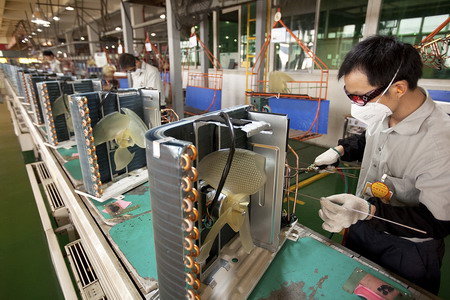Statistics
Chinese PMI at three-month low
By Chen Jia (China Daily)
Updated: 2010-12-31 09:12
 |
Large Medium Small |
|
 |
|
Workers assemble air conditioners at Gree Electric Appliances Inc's factory in Zhuhai, Guangdong province. China's industry output index declined to 56.8 in December, and the new orders index came in at 55.7 as both fell to the lowest level in three months. [Photo / Bloomberg] |
Decline follows government's move to stabilize prices and adopt tightening policy
BEIJING - The Chinese purchasing managers' index (PMI), which tracks manufacturing growth, fell in December to the weakest level in three months.
The decline came after the central government decided to stabilize commodity prices and tighten monetary policy.
PMI decreased to 54.4 from 55.3 in November, the first decline in five months, reported HSBC Holdings Plc and Markit Economics, a specialist compiler of business surveys and economic indices, on Thursday.
The index for the last quarter of 2010 is the strongest since the first three months, said the report.
The industry output index declined to 56.8, and the new orders index came in at 55.7 as both fell to the lowest level in three months. However, seasonally adjusted data still indicated industrial expansion as it remained above 50 for five consecutive months, according to HSBC.
The growth of new export orders was modest, and the level of domestic orders rose faster than for foreign ones, after policymakers vowed to boost the domestic commodity market, the report said.
Staffing levels in the Chinese manufacturing sector rebounded to 51.5. That's 1.3 percent higher than in November, indicating the highest job-creation rate since June, HSBC said.
Prices charged by Chinese manufacturers, which decreased by 7.5 percent to 59.1, were slightly curbed by six hikes of the reserve requirement ratio and two interest rate rises for banks, said Dong Xian'an, chief economist of Industrial Securities.
Industrial production momentum in the country is still strong, said Dong, and higher interest rates, raised by the central government on Dec 25, will further hit real-estate speculation and counter soaring inflation,
"Tight monetary policy should remain, although the PMI growth slowed a little in December, helping to further curb inflation next year," he said.
JPMorgan Chase & Co forecast that the People's Bank of China, the nation's central bank, may raise the benchmark one-year savings rate three times in 2011, and the reserve requirement ratio may be increased twice.
"China may allow greater appreciation of the yuan in coming months, to relieve inflationary pressure and to be in line with rebound demands in domestic markets," said Wang Qian, JPMorgan's Hong Kong-based chief economist.
Wang predicted China's economy will maintain stable growth in 2011, with a 9 percent rate of expansion, and the central bank may tighten lending, especially for the real estate sector, in the first quarter of the year.
Rising corporate profits and expansions by companies including Aluminum Corp of China Ltd and Volkswagen AG may help to sustain manufacturing as the government curbs lending to counter inflation.
"Inflation rather than growth still remains as the top policy concern, despite the moderation in December's manufacturing PMI reading," said Qu Hongbin, Hong Kong-based China economist for HSBC. "Modest" interest-rate increases are needed to anchor inflation expectations in coming months, Qu said.
The PMI measure is based on a survey of executives at more than 430 companies and gives an indication of activity in the manufacturing sector. A separate government-backed PMI is due on Jan 1.
Higher interest rates, a crackdown on real-estate speculation, and closures of energy-wasting and highly polluting factories are among measures by the central government that may cool growth.
Thursday's data "suggests industrial production momentum is still strong, though sentiment may have been weakened a bit by recent tightening measures and companies' lingering concern over how such tightening is going to play out", said Li Wei, Shanghai-based economist with Standard Chartered Bank.
Peng Sen, vice-chairman of the National Development and Reform Commission, said the nation must prepare for a long-term fight against inflation, according to a Dec 21 report on China Central Television.
Companies in China, the world's biggest maker of steel, cement and mobile phones, are expanding after exports topped pre-crisis levels. The momentum of economic growth is "consolidating", the central bank said on Dec 27.



